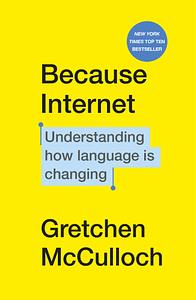Take a photo of a barcode or cover
This book is a lot more fun to read than you might suspect. A thorough rundown on various groups’ understanding of and fluency in communicating on the internet. Plus your guide to emojis, memes and the way the internet is changing language. Not to worry, McCulloch says. English is tough and durable and all languages evolve. Really liked this book.
An amazingly thoughtful and well-researched snapshot of our current moment in internet culture and linguistics, and the history that got us here. Brilliant book.
I was taught to believe that grammar is a set of rules that has stood the test of time. So much so that these rules make up an entire section in the library - from dictionaries to guides of English usage to thesauruses (thesauri??). These rules are steadfast, researchable and long-standing. (I have a frickin' degree in this, ffs)
But McCulloch throws all of that on its head.
The internet is making language rules change - and fast. For example, be careful when adding 2 spaces after a period - you are automatically limiting your audience by doing so. Still taking a stance about the 'oxford comma'? - you can be shunned for that kind of archaic behaviour now. Be careful about even adding a period at the end of your thought since it is now considered to be a passive aggressive act (.) Grammar rebels have taken hold and their reach is both global and instant.
McCulloch delves into fascinating intricacies of slang, tHe uSe oF rAndOm cApiTalIsaTiOn, cat memes and the purposeful omission of question marks and other punctuation. Using emojis to convey the gestures of real-life conversation is a thing - so adapt. She dedicates an entire chapter to the history, evolution and current use of emojis and, I'll let you know now, they are not a passing trend.
We all fit into slots of the internet timeline. Depending on when we first began using the internet and how we used it, everyone can be categorized as Old Internet, Semi-Internet, Post Internet people - which is evident through our ease of adapting to new platforms, our facility with changing modes of communication and our understanding of what is going on behind the scenes of commands and clicks. I fall into semi-internet, having been introduced to it ~40 years ago, in grade 7 at school, joining multiple list-serv forums and using dial-up modems -as well as my preference for :-)
Language has always been dynamic, she reminds us. And our world wide web has made it uber-dynamic. Because ... Internet!
But McCulloch throws all of that on its head.
The internet is making language rules change - and fast. For example, be careful when adding 2 spaces after a period - you are automatically limiting your audience by doing so. Still taking a stance about the 'oxford comma'? - you can be shunned for that kind of archaic behaviour now. Be careful about even adding a period at the end of your thought since it is now considered to be a passive aggressive act (.) Grammar rebels have taken hold and their reach is both global and instant.
McCulloch delves into fascinating intricacies of slang, tHe uSe oF rAndOm cApiTalIsaTiOn, cat memes and the purposeful omission of question marks and other punctuation. Using emojis to convey the gestures of real-life conversation is a thing - so adapt. She dedicates an entire chapter to the history, evolution and current use of emojis and, I'll let you know now, they are not a passing trend.
We all fit into slots of the internet timeline. Depending on when we first began using the internet and how we used it, everyone can be categorized as Old Internet, Semi-Internet, Post Internet people - which is evident through our ease of adapting to new platforms, our facility with changing modes of communication and our understanding of what is going on behind the scenes of commands and clicks. I fall into semi-internet, having been introduced to it ~40 years ago, in grade 7 at school, joining multiple list-serv forums and using dial-up modems -as well as my preference for :-)
Language has always been dynamic, she reminds us. And our world wide web has made it uber-dynamic. Because ... Internet!
informative
fast-paced
future self: add this to the reading list for any graduate courses in digital cultures you may teach in the future.
Very interesting book! Definitely held my interest more than many other nonfiction books can. Went very in-depth without going over my head.
funny
informative
medium-paced
informative
relaxing
fast-paced
This more or less instantly became one of my favorite books. Fascinating history and current analysis of things I participate in and think about as an internet user (blend of Full Internet Person and Semi Internet Person by her taxonomy), editor, and word nerd. This is the sort of the book where you are constantly wanting to go tell some one the latest tidbit you just read. (They know who came up with lol! "Hello" was invented for the telephone! She just made a relevant Hamilton reference! Wait, how did I miss the sarcastic tilde?)
I've been sliding toward a more and more descriptive versus prescriptive perspective on language for a long time, and McCulloch certainly encourages that strongly (as all linguists do, really). But her distinction between formal and informal language helps to explain how I can do that and be a picky copyeditor as part of my job as well.
Read this because it's so so interesting. Gift this to other people who will find it interesting... and and also people who are afraid that texting abbreviations are ruining written language. It'll be a mitzvah to set their minds at ease. :)
I've been sliding toward a more and more descriptive versus prescriptive perspective on language for a long time, and McCulloch certainly encourages that strongly (as all linguists do, really). But her distinction between formal and informal language helps to explain how I can do that and be a picky copyeditor as part of my job as well.
Read this because it's so so interesting. Gift this to other people who will find it interesting... and and also people who are afraid that texting abbreviations are ruining written language. It'll be a mitzvah to set their minds at ease. :)





